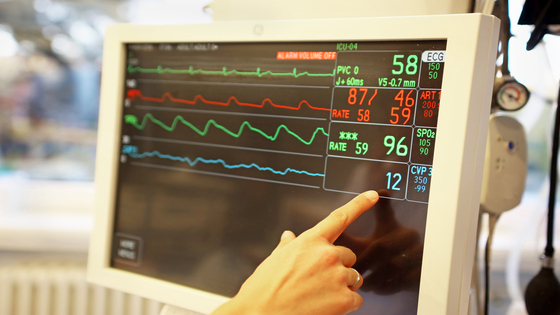Are you looking for a career as a medical assistant? Well, here’s what you need to know about medical assistants and EKGs.
If you\’ve ever wanted to pursue the profession of medical assistant, you may have wondered to yourself, \”Can medical assistants do EKGs?\”
Before answering that question, however, it\’s important to understand what an EKG is, what it\’s used for, how you perform one, and the steps involved in becoming an EKG technician.
Medical assistants have many responsibilities. There are also many types of medical assistants with varying job descriptions.
So, let\’s take a closer look at the answer to the question, \”Can medical assistants do EKGs?\” and what that process involves.
What is an EKG Test?
So, what is an EKG test? An electrocardiogram, also known as an EKG test, is a procedure meant to measure heart activity.
A patient\’s heart sends an electrical signal through their heart with each beat. The EKG simply shows the rate of the heartbeat.
Doctors can then use the information provided by the EKG to determine whether the patient\’s heartbeat is happening at a normal rate and level of strength.
If there are any abnormalities detected, that may be a sign of some sort of underlying heart issue the doctor needs to address.
Other information the EKG reveals includes the position and size of the heart\’s individual chambers. It can also be called an ECG test.
EKG tests are a very common procedure used at healthcare facilities everywhere. They\’re rather routine and can often be performed by multiple members of a hospital\’s staff.
What is an EKG Used For?
Essentially, an EKG test allows healthcare professionals to monitor a patient\’s heart activity.
This aids the doctor in recognizing abnormal rhythms or determining if there are any other number of heart disorders like an irregular heartbeat, a blockage in the arteries, heart damage, or failure.
In short, an EKG shows the doctor if anything is wrong with the heart.
EKGs are typically used for patients experiencing some sort of discomfort, or who may be suspected of having suffered a heart attack or other kind of heart condition.
It is often a routine examination for middle-aged and senior patients. You can perform EKGs in a clinic, doctor\’s office, hospital, or ambulance.
There are a few details to keep in mind before conducting an EKG test.
How do you prepare a patient for an electrocardiogram? Preparing patients for testing involves potentially shaving certain areas of a patient\’s body to provide easier access for the electrodes. Hair can sometimes prove to be an obstacle for EKG tests.
How do you Perform an EKG Test?
Now that you understand what it\’s used for, here are the basic steps on how to conduct an EKG test. They\’re fairly straightforward.
First, ask the patient to lie down on the examination table. Explain the process to them to get them comfortable.
The medical assistant then places a few electrodes on the patient\’s chest, arms, and legs. It helps to have the patient wear a hospital gown.
So, how does an EKG work? The electrodes connect to a computer that provides readings of the patient\’s heart activity. The data will then feed into the computer monitor and will print out.
Once the paper prints out, the data is then ready for the doctor and medical assistant to analyze. Eventually, results are shared with the patient.
The process is a quick one — it typically takes around three minutes to complete.
Can a Medical Assistant Read an EKG?
So can medical assistants do EKGs? The answer is yes, but only with the right training. Medical assistants with correct training can do EKGs — they are called EKG technicians.
EKG training for a medical assistant is absolutely necessary if they want to be able to reliably conduct an EKG test.
Beyond answering questions like, \”Why perform an EKG exam?\” and others, EKG training for a medical assistant involves learning the different types of EKG machines.
This is important because there are variations in testing. You\’ll also learn the cleaning and general maintenance of EKG machines.
When a medical assistant performs an EKG on a patient, they need to know how to read heart monitors.
Your training should also include a medical assistant EKG practice test. This drill assesses your proficiency at performing the core functions of conducting an EKG test.
A comprehensive training program should teach an aspiring medical assistant everything they need to know about using an EKG machine.
Reading an EKG involves learning about the machine itself as well as being able to interpret the test results. This takes time and practice.
When medical assistants do EKGs, it\’s critical that they know what they\’re reading and how to communicate the results to the patient.
How do I Become an EKG Technician?
Becoming an EKG technician involves receiving training on how to be a medical assistant as well as receiving EKG certification. This demonstrates that you:
- Understand the various steps and functions involved in conducting an EKG test.
- Can perform an EKG test and have proven the ability to do so in the past.
- And that you possess all requisite knowledge to succeed in the role.
Once you\’ve completed this certification, you\’ll have the option to become an EKG technician.
The key question to ask yourself is where do you want to receive your training? It helps to get accredited educational training that can give you all the tools, information, and skills you need to receive your EKG technician certification.
Its also important to opt in for an online learning platform that allows you to approach your education with flexibility. You should be able to learn on your own schedule and you can at Southern Careers Institute.
SCI has a robust medical assistant program that can help you receive your EKG certification in as little as 36 weeks!
Let SCI help you find purpose and meaning, giving you the freedom to find meaningful work. For more on how SCI can help, contact us today!
Sources
- https://www.bls.gov/ooh/healthcare/medical-assistants.htm
- https://medlineplus.gov/lab-tests/electrocardiogram/
Blog Disclaimer: Information stated in this blog is for general information purposes only. SCItexas.edu does not assume or guarantee income earning potential or salary expectations based on the programs offered at Southern Careers Institute. Career and program information stated in this blog does not guarantee that programs and specifics are offered at Southern Careers Institute.











